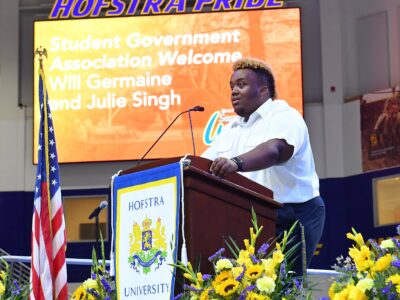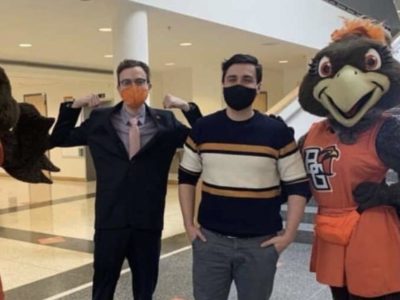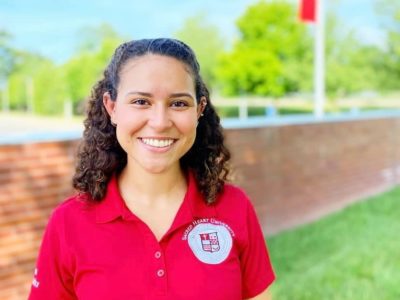Martin Barnard, Cleveland State University’s class president takes us through his journey of navigating his term through the Covid-19 pandemic. He recounts his struggles and success leading the undergraduate and graduate student population. Additionally, he details his work and dedication to accomplishing his goals and uniting Cleveland State University’s community.
Through time, work and dedication, Martin shows us what it means to successfully navigate your term as Student Body President.
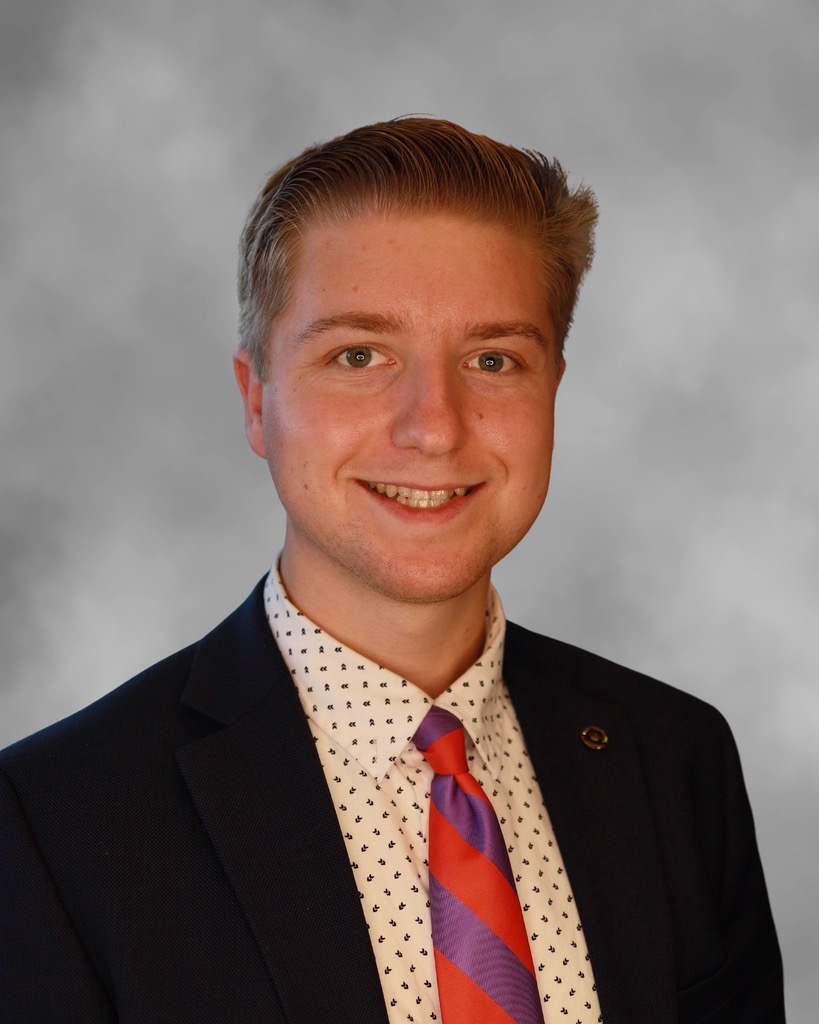
Q: What inspired you to run for office?
A: The growing needs of CSU’s student body inspired me to run for office. I had been a Senator in SGA for two years and noticed that our organization was talking about surface level issues like parking tickets and planting trees outside. When it came to leadership, diversity or working on projects with leaders of our Faculty Senate, College Deans and University Administration, SGA wasn’t known for addressing the needs of our students. I decided to run for office during a year where all of CSU’s operations had been thrown into disarray due to the COVID-19 pandemic. It was time for structure, patience and cultures to come together. I like to believe our team was able to fulfill those needs at the right time.
Q: How did you feel after being elected as President?
A: Initially, I was feeling overwhelmed because several members of SGA had graduated after Spring 2021, leaving the organization with five Senators for a student population of over 15,000. My team and I decided that it would be best to meet over Zoom on a bi-weekly basis so we could mobilize our numbers and get a Speaker of the Senate appointed in May. This marked the first time our organization had ever moved a major operation and confirmed a majority of our Cabinet members over summer break. Once we began to create long-term goals for the organization while building our team full of talented leaders, I began to feel like we were in a position to be taken more seriously by all students on campus.
Q: What inspires you to create change?
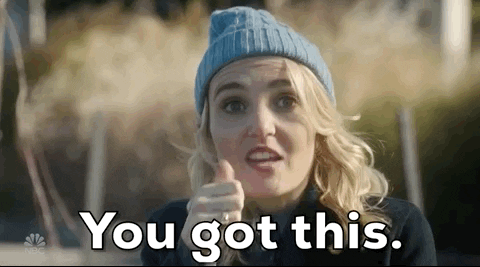
A: Doing the right thing inspires me to create change. Doing the right thing takes courage, intellect and bravery to push through any resistance that might arise while seeking change. To give an example of doing the right thing, sometimes it is easier to just go with the flow and keep doing things as they had always been done. However, our organization had not updated its governing documents in over two years up until my team was elected. Even when we wanted to do things the right way, the needs of our time had changed and so our organization and its leaders needed to change. Change is difficult and people don’t always feel comfortable with it. But, once you communicate clearly about why a change is needed and how the team can be better by doing it, an organization can create unlimited possibilities and a more optimistic outlook for the future.
Q: What ways have you started changing CSU’s campus?

A: We have started changing CSU’s campus by bringing students, faculty and administration together to solve complex issues about our experiences at this university. For example, our team was able to double down in the fall and coordinate the first-ever SGA cultural event called ‘Vikes Around the World.’ By pushing through a variety of obstacles and challenges, the team was able to showcase 10 presentations from diverse students to over 250 CSU Vikings. Currently, our team is following up with that initial success by planning to bring student leaders together for monthly leadership meetings where communication, collaboration, and long-term planning skills can be improved in the future.
Q: What skills have you gained during this term?

A: If I could ask a general student about what skills I have developed in this role, I believe they would say negotiation, delegation and task management. Negotiation should be highlighted because we have had several long meetings with CSU Administrators and Faculty Representatives that required us to think critically and openly debate our options. Most of these discussions centered around our university’s response to the COVID-19 pandemic and we learned where we had to compromise, where we had to remain firm and where we needed to concede our position.
Delegation should be highlighted because this year has been focused on allowing other leaders to take initiative and follow through on what they say they will do. Last year, it was apparent that only the President was taking action and getting things accomplished. That didn’t sound like teamwork to me, so I made sure to delegate specific tasks out to our Cabinet and Senate to allow us all to achieve more than any other team. Along the way, I have learned how to speak clearly to individuals, small groups and large audiences.
Task management should be highlighted because while it is difficult for me to admit, I failed at this during the Fall semester and had to learn the hard way. I failed because there was no follow up or accountability offered when leaders would agree to fulfill certain tasks. I had to overcome weaknesses in my personality to firm up, actively listen to what others are saying and prepare to help others if they need it. By failing, I learned how important it is to be specific, maintain trust in others and lead by example.
Q: How will you apply these skills to your future career?
A: I am currently enrolled at CSU in their MBA Program. To be a successful entrepreneur or business owner someday, I absolutely needed to gain first-hand experience with negotiation, delegation and task management skills. Now that my weaknesses and failures have been put on display in this safe college environment, I have learned valuable lessons that could have led to serious results in the real world. I know that by increasing my skills in these areas, I will be better able to manage a world-class company in the future.
Q: What is the most challenging aspect of being Student Body President?

A: The most challenging aspect, in my view, is truly representing all students. CSU was one university that chose to stay away from a vaccine mandate, which put serious amounts of stress on our student body. Many were begging and pleading for more strict policies, while there were significant populations who signed petitions and threatened to leave if a mandate was announced.
My team and I spent several months collecting our own data, working with administrators including the President and Provost and speaking with many groups of students to try and get a clear number on who wanted what. Gathering data like that is important, because when you (hopefully don’t) catch yourself speaking to groups without hard data behind it, the credibility of yourself and the entire organization is suddenly at risk. The hardest part was being honest, staying transparent and fighting to remain in the middle of a heated, political debate among all members of our campus community from top to bottom.
Q: What is the most rewarding aspect of being Student Body President?
A: The most rewarding aspect of serving as student body president is knowing that small wins lead to big results. One of our team’s small wins this year was selecting three Cabinet members during the summer. Every other SGA team before us had waited until October to select members of its Cabinet. It was a small win for us because 3/7 available positions were less than half of where we wanted to be, but our success in getting 3 appointed that early has led to other small changes in the general timeline of the term and now future teams can enjoy a luxury of having the summer months to plan out their year ahead. Our small decisions along the way have great outcomes on those who will follow. I like to think somehow those future teams will create even larger impacts on their communities.
Q: Do you think Covid-19 has affected your presidency and mission?

A: COVID-19 almost defined the term of my presidency. It was the single-largest topic of conversation among students, faculty and administration for roughly 75% of the year. However, my team and I found ways to focus our energies on delegation so that we could bring diversity & inclusion, active student engagement and improved communication among student organization leaders to the forefront of what we could achieve. For example, while COVID truly dominated our conversations with Faculty Senate, we were able to meet with the leaders of our Student Athlete Advisory Council – a group that sees over 150 student athletes involved. By taking that first step and introducing our organizations, we were able to get connected with the President’s Appointed Faculty Rep to Athletics, who is currently helping us form structure for the first-ever President’s Council at CSU.
Q: What do you want to be remembered for as Student Body President?
A: I want to be remembered for being the president who made SGA well known on CSU’s campus. After I graduate, my hope is that future students actively apply and debate during Election Season, Faculty Leaders engage with regularly scheduled SGA Senate Meetings and Administrators actively seek out SGA Reps for their focus groups, committee meetings, and points of contact with our general students. If I was successful in my term, SGA would be known for making positive change at CSU, following through on what the majority of students want and achieving more by meeting with every leader on campus.
Q: What tips do you have for future Presidents?

A: My biggest tip for future Presidents is to take every challenge or obstacle with a grain of salt. Whether you are struggling to draft a professional letter addressing the student body, accomplish a major achievement like inviting a public official to campus and taking care of all the arrangements or holding members of your team accountable, even when they are your friends. Just know that no issue is too large for you and your team to handle. You are in your role for a reason. The students of your campus saw something in you and wanted your voice to represent them. Use that to increase your confidence when you are speaking with large groups of students, leaders of your Faculty Senate or during meetings with your university President. Allow your leadership to shine, learn from every failure and remember that no one else can make your term as successful as you. Stay strong, act smart and keep the faith. If you really want to see positive change on your campus and are willing to put in the hours, phone calls and tough conversations to get it done, then you are the right one for this role.









